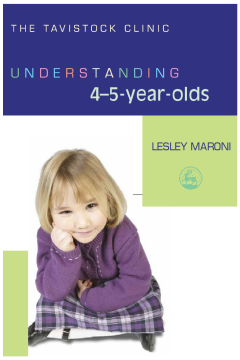
Additional Information
Book Details
Abstract
Understanding 4-5-year-olds gives a thoughtful overview of the challenges that children face as they gradually move away from a strong attachment to their families and turn towards the wider world of school and life outside the family.
Lesley Maroni discusses the critical social and emotional developments at this age, including identity, independence and sibling rivalry, the transition to school and friendships with peers, coping with illness and loss, and gender differences. The author also shows how 4-5-year-olds explore real issues using the protective safety of pretend play and their imagination.
This accessible book provides valuable insights and a wealth of case examples that will help parents, educators and carers better understand and relate to children at this demanding, yet exciting, stage of development.
Written in a simple, engaging style, citing plenty of familiar examples from home and school, Lesley Maroni brings the world into focus from a child's perspective, revealing the enormity of the challenges they face at this age as they make significant transitions from the more contained environment of home and preschool to the larger world of primary school... The book provides a clear background to the social and emotional development of children this age. It guides adults through this demanding, transitory period, revealing the coping mechanisms behind many behaviours and showing what support can be given at home and school. Having previously felt overwhelmed by the emotional neediness and demands of 4-5 year old, this book has left me with more appreciation of the daily pressures they face. I have a heightened awareness of the distress these struggles can cause, and greater confidence to work with this age group in a firm, supportive manner. I am keen to read more of the series to find out how the story of development unfolds.
Primary First, Clare Fernandes Norris
Review for all of the series
'They are a rich resource of balanced, sensitive and non-judgemental advice to help parents and professionals looking after children…The central subject is the mental and emotional development of children and their parents. And the style is intelligent and friendly… The books form a cohesive and continuous guide to almost everything I have ever wondered about bringing up my children.'
0-19 Magazine
It is refreshing to read a book that focuses on this age group as young individuals, not as children who have to be fitted into adult-determined framework. Lesley Maroni explores sensitively how they try to make sense of daily life. She offers valuable descriptions of the ways children's perspective and confusion, emerge through their play and conversation. Like others in the Understanding Your Child series from the Tavistock Clinic, the book is written both for parents and practitioners.
Nursery World
Lesley Maroni, MA, MPsychPsych, MACP is a child and adolescent psychotherapist. She is currently in the process of setting up and running a child psychotherapy service in primary schools in Fulham. She is a visiting lecturer and seminar leader at the Tavistock Clinic.
Table of Contents
| Section Title | Page | Action | Price |
|---|---|---|---|
| 1 Introduction Participatory statistics: a ‘win–win’ for international development Jeremy Holland | |||
| PART I Participatory statistics and policy change | |||
| 2 Participatory 3-dimensional modelling for policy and planning: the practice and the potential | |||
| Giacomo Rambaldi | |||
| 3 Measuring urban adaptation to climate change: experiences in Kenya and Nicaragua Caroline Moser and Alfredo Stein | |||
| 4 Participatory statistics, local decision-making, and national policy design: Ubudehe community planning in Rwanda | |||
| Ashish Shah | |||
| 5 Generating numbers with local governments for decentralized health sector policy and planning in the Philippines | |||
| Rose Marie R. Nierras | |||
| 6 From fragility to resilience: the role of participatory community mapping, knowledge management, and strategic planning in Sudan | |||
| Margunn Indreboe Alshaikh | |||
| Part II Who counts reality? Participatory statistics in monitoring and evaluation | |||
| 7 Accountability downwards, count-ability upwards: quantifying empowerment outcomes from people’s own analysis in Bangladesh | |||
| Dee Jupp with Sohel Ibn Ali | |||
| 8 Community groups monitoring their impact with participatory statistics in India: reflections from an international NGO Collective | |||
| Bernward Causemann, Eberhard Gohl, C. Rajathi, A. Susairaj, Ganesh Tantry and Srividhya Tantry | |||
| 9 Scoring perceptions of services in the Maldives: instant feedback and the power of increased local engagement | |||
| Nils Riemenschneider, Valentina Barca, and Jeremy Holland | |||
| 10 Are we targeting the poor? Lessons with participatory statistics in Malawi | |||
| Carlos Barahona | |||
| PART III Statistics for participatory impact assessment | |||
| 11 Participatory impact assessment in drought policy contexts: lessons from southern Ethiopia | |||
| Dawit Abebe and Andy Catley | |||
| 12 Participatory impact assessment: the ‘Starter Pack Scheme’ and sustainable agriculture in Malawi | |||
| Elizabeth Cromwell, Patrick Kambewa, Richard Mwanza, and Rowland Chirwa with KWERA Development Centre | |||
| 13 Participatory impact assessments of farmer productivity programmes in Africa Susanne Neubert | |||
| Afterword | |||
| Robert Chambers | |||
| Practical and accessible resources | |||
| Index |
